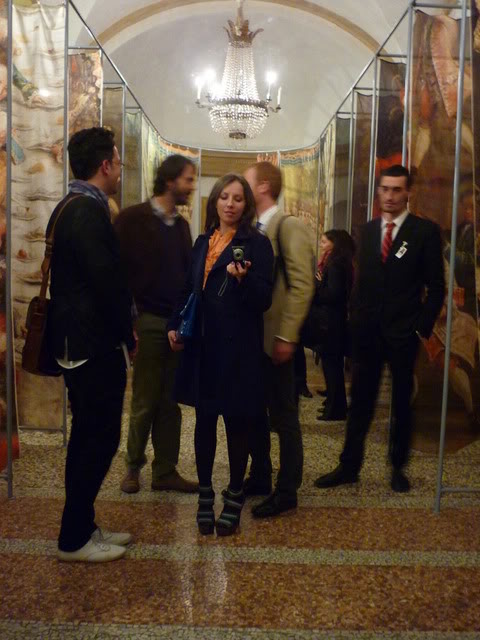Am currently loving Nietzsche. He's a bit nuts and surprisingly funny. I'm reading Beyond Good and Evil and even I'm taken aback at the number of times I laugh out loud while reading. I've turned down plenty of page corners and underlined juicy morsels - my intention is to write a proper, meaty Nietzsche post at some point in the future, but for today this excerpt must suffice. I find his insights into those who purport to practice "high culture" to be particularly interesting, his observations are as true now as they did over 100 years ago. Having said that, the next chapter ends with the statement, "we men wish that women should not go on compromising herself through enlightenment..." Ouch. Still arranging my opinions on the great philologist.
Anyway, the excerpt:
In late ages that may be proud of their humanity, so much fear remains, so much superstitious fear of the "savage cruel beast" whose conquest is the very pride of these more humane ages, that even palpable truths remain unspoken for centuries, as if by some agreement, because they look as if they might reanimate that savage beast one has finally "mortified." Perhaps I dare something when I let one of these truths slip out: let others catch it again and give it "milk of the pious ways of thinking" to drink until it lies still and forgotten in its old corner.
We should reconsider cruelty and open our eyes. We should at long last learn impatience lest such immodest fat errors keep on strutting about virtuously and saucily, as have been fostered about tragedy, for example, by philosophers both ancient and modern. Almost everything we call "higher culture" is based on the spiritualization of cruelty, on its becoming more profound: this is my proposition. That "savage animal" had not really been "mortified"; it lives and flourishes, it has merely become - divine.
[and here's the crux!] What constitutes the painful voluptuousness of tragedy is cruelty; what seems agreeable in so-called tragic pity, and at bottom in everything sublime, up to the highest and most delicate shudders of metaphysics, receives its sweetness solely from the admixture of cruelty. What the Roman in the arena, the Christian in the ecstasies of the cross, the Spaniard at an auto-da-fe or bullfight, the Japanese of today when he flocks to tragedies, the labourer in a Parisian suburb who feels a nostalgia for bloody revolutions, the Wagnerienne [note the feminine!!] who "submits to" Tristan and Isolde, her will suspended - what all of them enjoy and seek to drink in with mysterious ardour are the spicy potions of the great Circe, "cruelty."
To see this we must, of course, chase away the clumsy psychology of bygone times which had nothing to teach about cruelty except that it came into being at the sight of the sufferings of others. There is also an abundant, over-abundant enjoyment at one's own suffering, at making oneself suffer - and wherever man allows himself to be persuaded to self-denial in the religious sense, or to self-mutilation, as among Phoenicians and ascetics, or altogether to desensualization, decarnalization, contrition, Puritanical spasms of penitence, vivisection of the conscience, and sacrifizio dell'intelletto a la Pascal, he is secretly lured and pushed forward by his cruelty, by those dangerous thrills of cruelty turned against oneself.
Finally consider that even the seeker after knowledge forces his spirit to recognize things against the inclination of the spirit, and often enough also against the wishes of his heart - by way of saying No where he would like to say Yes, love, and adore - and thus acts as an artist and transfigurer of cruelty. Indeed, any insistence on profundity and thoroughness is a violation, a desire to hurt the basic will of the spirit which unceasingly strives for the apparent and superficial - in all desire to know there is a drop of cruelty.
Subscribe to:
Post Comments (Atom)




2 comments:
"When a woman turns to scholarship there is usually something wrong with her sexually."--Nietzsche
The poor man was human, all too human.
Though Nietzsche's sexist tendencies are off-putting (and I do not share his initial love of Wagner), he does have some brilliant and uplifting insight when discussing other topics, particularly the arts. I renewed my high school library's copy of "Zarathustra" so many times that the librarian let me keep the battered old thing at the end of my junior year. It's going to university with me this year, despite the fact that it's held together with tape and rubber bands.
Post a Comment